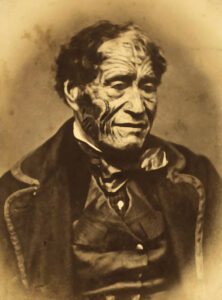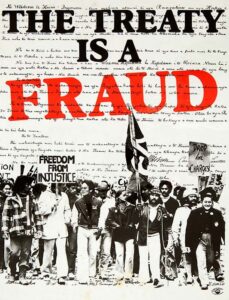1840: Hobson’s Treaty Refused, Blankets Thrown Back At Him
February 22, 2022
By AHNZ

To the current iteration of mainstream history the Treaty of Waitangi has become a constitutional document and used as a panacea for all sorts of political exploitation. Yet during most of our history it was recognised as a fraud or a legal nullity. It was a trick played by Captain Hobson to take over the North Island from the Settlers and a back-up in case Discovery were not enough to take over the South Island. The reality of The Treaty is that it was simply a ploy by yet another Man Who Would Be King in a long line of such men who inspired Rudyard Kipling to write a novel of that title in 1888.
The current iteration of our history in which The Treaty is holy was instituted by Labour 4.0 by Treaty of Waitangi Amendment Act (1985) and State Owned Enterprises Act (1986.) Leading up to this time the Treaty was openly considered to have no legal power and such a fraud that Maori protest signs broadcast this perspective far and wide even to the early 1980s.
 We do not need to wait until the 1980s to find Maoris rejecting The Treaty because they were doing decisively in the same month that it was signed. On 14 February, 1840, Maori chiefs make it clear what the Treaty means to them.
We do not need to wait until the 1980s to find Maoris rejecting The Treaty because they were doing decisively in the same month that it was signed. On 14 February, 1840, Maori chiefs make it clear what the Treaty means to them.
William Hobson was annoyed on leaving a seemingly successful meeting at Waka Nene’s (image left) Hokianga district when a canoe overtook his boat with a letter from 50 chiefs and the gifted blankets were thrown into the Governor’s boat too – “…if the Governor thought they had received the Queen he was very much mistaken and then they threw in the blankets they had received.”
One thing I love about this story is that the Maori waka licked Hobson’s canoe in a speed race! They ran circles around him, hand-delivered an official document, and dumped on the self-anointed ‘Lieutenant-Governor of New Zealand’ his bribery blankets!
This history, of course, is disruptive to the modern narrative. Do not try to use it in your Government school history exam answer booklet. Anarchist history is disruptive to the mainstream.
“Thus, although Hobson was beginning to collect signatures, there was little ground for the construction he put upon them. Even at Hokianga, Nene’s district, Hobson was annoyed on leaving what appeared to have been a successful meeting, when a canoe overtook his boat and a letter from fifty chiefs was handed across ‘saying that if the Governor thought they had received the Queen he was very much mistaken and then they threw in the blankets they had received into our boat’. The gulf between Maori and British purposes in 1840 was very great d even on the most optimistic view it would have taken very sensitive statecraft to reconcile them.” – Ward (1973) quoting Rev. Richard Taylor
“Hobson was not possessed of overmuch sensitivity. As far as the actual declaration of British sovereignty was concerned, nether he nor the missionaries were inclined to regard Maori objections and reservations as critical. Hobson had long favored the annexation of the whole of New Zealand and from the moment of landing began to perform acts of sovereignty. At Waitangi he accepted the signatures of the chiefs, well aware that they were largely signing in trust of missionary assurances as to their future position and without clear understanding of the Treaty’s implications. His instructions to officers who subsequently hawked the Treaty about the country also suggest that he saw the task as an exercise in public relations rather than a weighty mission..” – Ward, ibid
“Colonies were a nuisance. They only caused trouble and often involved the expense of maintaining troops to protect them. England wanted no more colonies, and would have been glad to be rid of many that she already had. The new colony in New Zealand was a plan of no government, but of a business man in the City of London.” – Curtain-raiser to a Colony, C & C Manson (1962)
The distrusted Treaty was seen for what it was by our Colonial and Native ancestors. It was not until the Kohimarama Conference (1860) that Crown sovereignty was accepted by the tribes. Even then, Maoris did not conclude that the emerging institution The House of Representatives was the boss of them. The House became like one of those hatched shark embryos in their mother’s belly that starts eating up its siblings. The Governor and his executive became symbolic and has remained so ever since The House pushed them to one side. The Legislative Council suffered the same fate, even being dissolved as a temporary “interim” measure in 1951 but never seen again. Provinces and all local government are either abolished or amalgamated or otherwise more replaced by centralised power at the Beehive every day.
Maoris wanted, and achieved, their own Maori Parliament (Te Kotahitanga) and own Maori Councils. These were promptly captured, de-fanged, and dissolved by The House as well. The House of Representatives is the last power standing having totally taken over our democracy. Our politicians today continue to use The Treaty as Hobson once did. It is the New Zealand State’s most powerful propaganda tool to gain and keep power over free people whoever they are and wherever they came from, Maori and Anglo Saxon alike. Waka Nene’s kinsmen had wise insight from the very first when they dumped Hobson’s Treaty and blankets back into his boat.
—
Image ref. Tamati Waka Nene of Hokianga, Auckland Libraries Heritage Collections; Minor digital enhancement, AHNZ (2022)
Image ref. Poster from late 1970s, Waikato Museum, Claudia Orange, Te Ara
Ref. A Show of Justice: Racial Amalgamation in Nineteenth Century New Zealand, Alan Ward (1973)
Ref. 1840: “Britain did not want sovereignty over Māori”, AHNZ
2 thoughts on "1840: Hobson’s Treaty Refused, Blankets Thrown Back At Him"
Leave a Reply
 Like Comment Share
Like Comment Share






There’s alot of korero that was removed from history. I love on Nene’s Pa in Utakura Horeke aka Paremata Pa. It is the first Paremata and first Capital of New Zealand set up to tax the Merchants at the Docks in Horeke.
Being an Anarchist I’m no fan of taxation or capitals but I do like learning about Utakura..
https://ahnz.anarkiwi.co.nz/1883-utakura/